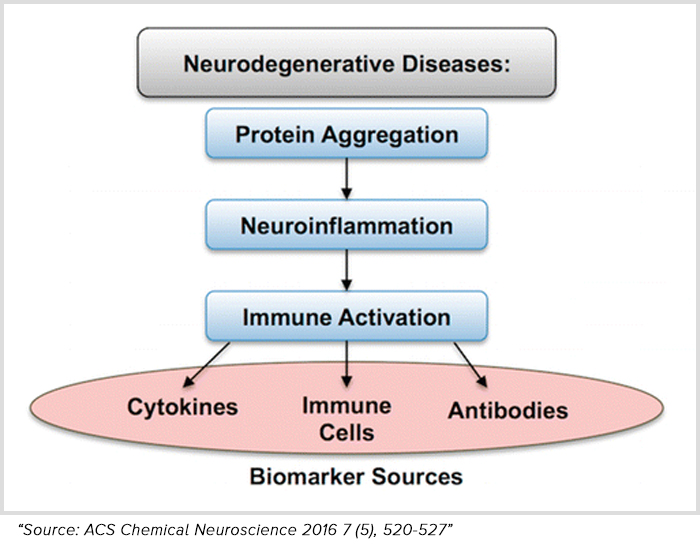The Great Connection: Immune system activation + neuroinflammation = neurodegenerative diseases

In the article entitled, The Immune System and Neuroinflammation as Potential Sources of Blood-Based Biomarkers for Alzheimer’s Disease, Parkinson’s Disease, and Huntington’s Disease, Lorraine Clark and Thomas Kodadek conclude, “The role of the immune system in neurodegenerative diseases has become obvious over the past few decades as demonstrated by the presence of activated microglia and astrocytes in brains of affected patients. Additionally, inflammatory markers such as cytokines and chemokines, and immune mediators such as lymphocytes and brain-reactive antibodies can be found in affected brain regions.”
Take away messages include:
- The original belief that the Central Nervous System is immune privileged has been revised after the discovery of inflammatory and immune mediators in the brains of patients with neurodegenerative diseases.
- The breakdown of the blood-brain barrier in AD and PD leads to subsequent infiltration of inflammatory and immune mediators from the periphery. Neuroinflammation might not be the result, but rather, the cause of an early development of neurodegenerative diseases.
- This cascade can contribute to chronic inflammation and eventually result in neuronal dysfunction and cell death.
- Research is ongoing to discover and evaluate various inflammatory and immune-related blood-based biomarkers.
Schedule Your Personal Phone Consultation
Learn more about how the Cunningham Panel™ of tests can assist you in diagnosing treatable autoimmune encephalopathies characterized by abnormal neuropsychiatric behaviors. Schedule your personal phone consultation with a Moleculera Labs clinical staff member by completing the form below or call Amy Cross, RN, at 405-239-5254.
The Immune System and Neuroinflammation as Potential Sources of Blood-Based Biomarkers for Alzheimer’s Disease, Parkinson’s Disease, and Huntington’s Disease
Lorraine F. Clark and Thomas Kodadek
ACS Chemical Neuroscience 2016 7 (5), 520-527 *
DOI: 10.1021/acschemneuro.6b00042






